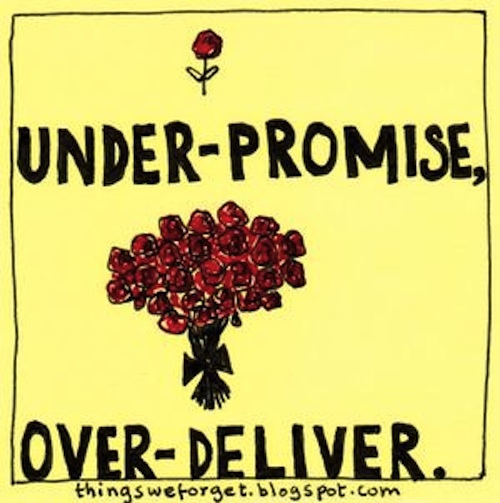Because of observations they initially made about Amazon, two researchers — Ayelet Gneezy at UC-San Diego and Nicholas Epley at University of Chicago — launched a study about reaction to promises and claims by others. It turns out no one really cares, research-wise, if you go above and beyond on something:
“I was surprised that exceeding a promise produced so little meaningful increase in gratitude or appreciation. I had anticipated a modest positive effect,” Epley said, adding, “what we actually found was almost no gain from exceeding a promise whatsoever.”
The data suggest that the reason for this lies in how we value promises as a society, he noted.
“Keeping a promise is valued so highly, above and beyond its ‘objective’ value,” Epley said. “When you keep a promise, not only have you done something nice for someone, but you’ve also fulfilled a social contract and shown that you’re a reliable and trustworthy person.”
The bottom line, according to Epley, is that exceeding a promise may not be worth the effort you put in.
“Invest efforts into keeping promises, not in exceeding them,” he said.
This all began, in part, because Amazon was so good at getting packages there even before they were expected — but that didn’t seem to be differentiating anything for them with customers (rather, it’s stuff like e-mailing exactly when a supply of the last thing you ordered is running out).
The bottom line for a business here would be “focus on your core tenets and don’t try to go above and beyond.” (No one cares.) For an individual or someone in a relationship, it’s almost the same: do your best and keep your promises, but going above and beyond isn’t everything (although interestingly, that is often something you hear when people break up — “He/she (typically he) didn’t go above and beyond”).
Sad ultimate takeaway from this: when you do something that you perceive to be “going the extra mile” and you don’t get the reaction you were hoping for, that’s not because people didn’t care or notice. It’s because they were being human, and the base idea there seems to be that this ‘extra mile’ concept really doesn’t hold a ton of value.
